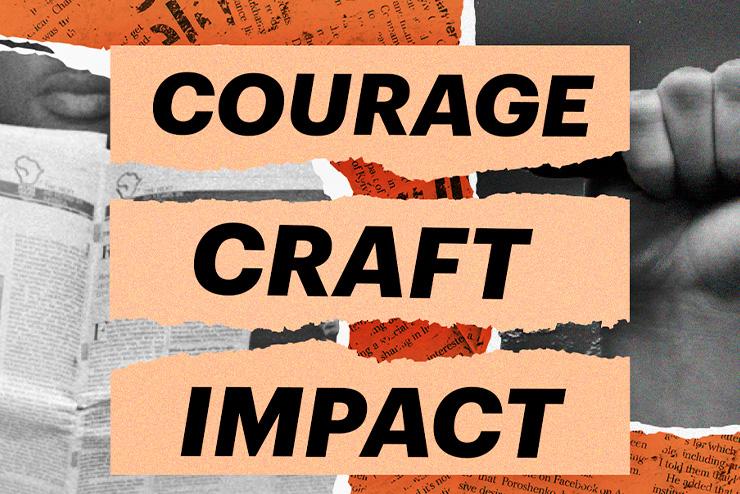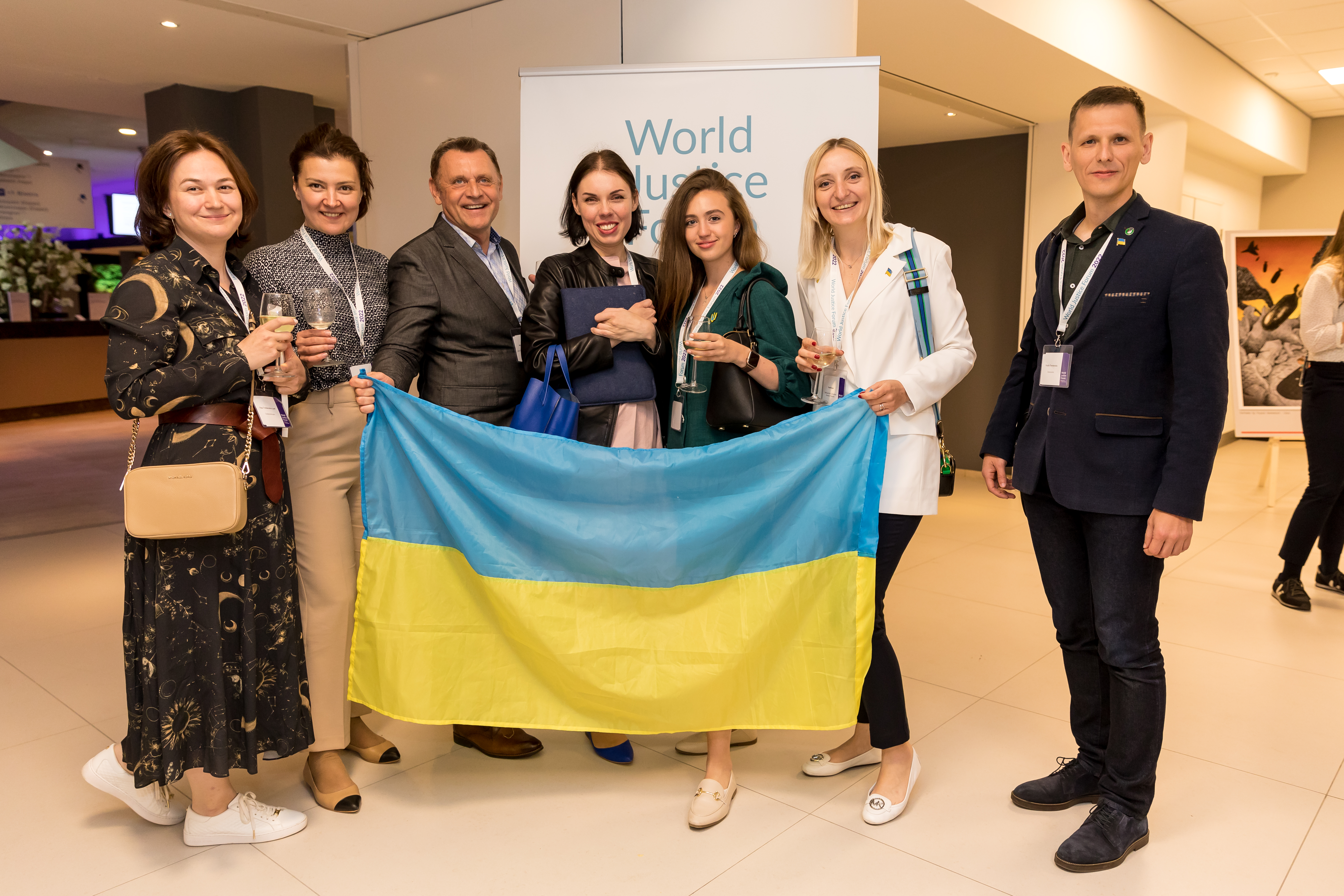


Three months after the Russian invasion of Ukraine, the World Justice Project sat down with Dariia Marchak, Chief Operating Officer of SE Prozorro.Sale, a World Justice Challenge finalist in the Anti-Corruption and Open Government Category.
SE Prozorro.Sale is a Ukrainian state enterprise that has transformed the country’s privatization process through an electronic auction platform that facilitates transparent sales of government assets to private companies. Since the war began, the company has continued its work, running auctions to raise money for Ukraine’s defense and humanitarian aid.
Marchak shared insights into SE Prozorro.Sale’s work as an anti-corruption platform and how months after the start of the war, Ukrainians are focused not just on resistance, but on building a better, stronger democracy.
Marchak’s remarks, which have been edited for clarity, are below.
Note: This interview was conducted at the World Justice Forum on May 30, 2022. Marchak has since joined Ukraine’s Ministry of Social Policy, where she serves as first deputy minister.
----
Do you see a connection between the Russian invasion and Ukrainian efforts to build the rule of law?
I think that reforms that Ukraine made after 2014 are directly connected to Russian aggression and the Russian war in Ukraine that started in February 2022.
Ukraine began to develop very rapidly. Not only did some businessmen benefit from this development, but the whole society. Within the last two years for example, most Ukrainian roads were absolutely rebuilt and for a long time, there was a Ukrainian dream about good roads, pedestrian lanes, an efficient public sector, and public prosperity and citizens’ prosperity.
These were the results of the development of the last eight years after the Revolution of Dignity. And my opinion is that Russia was afraid of these developments. It’s very dangerous for Russian society to have a dynamic, vibrant, democratic neighbor country which develops quickly and with prosperous citizens. It’s a very ‘bad’ role model for the Russian government.
Therefore, I am sure that Ukrainian development, democracy, and transparency are being perceived as a threat by Russia and its elites, which are not transparent, with the economy bringing benefits not to ordinary citizens, but a few who are attached to the government.
I think that Russian aggression is Russia’s answer to Ukraine’s democracy and the will to become a European nation, to be a country that no doubt is a European country by all standards—standards of living, standards of government, and standards of democracy.
How do you think about your work at Prozorro.Sale in relation to the current conflict?
I think most Ukrainians are sure that Ukraine will survive, will win, and most importantly, that we will still manage to build the best country in the world, the best country for ourselves—even more dynamic, beautiful, successful, democratic, and so on. And it’s not only an aspiration. It’s what every Ukrainian is doing right now.
This is the feeling that we have in Kyiv, in all regions, with all citizens working hard nowadays at any kind of front. We have this burden—everyone has their own front, and we need to do our part. My front is economic reforms, building transparency, and making efficient instruments for management of public assets.
This front has changed due to the Russian war, but we are trying to do our best at this moment in time to ensure that we are the most effective, the most efficient, and the most needed for the government to solve its problems in transparent and efficient ways. As an IT company, a state IT company, we understand that we cannot stay just somewhere apart from what is going on.
Could you talk a little about your work in the context of Ukraine as a former Soviet state?
Many countries around the world, especially former Soviet countries, struggle with privatization processes often characterized by mismanagement, corruption and murky deals with politically connected oligarchs. This was the case for Ukraine too. SE Prozorro.Sale was established to transform the public assets management in Ukraine through a transparent electronic auction system.
Every government buys and sells different products. For example, you can sell a license for natural resources, you can sell state or municipal property—land that is owned by municipal or local administrations.
But if your government is corrupt, it leads to a situation where on the one hand, those people that could be efficient users of these assets cannot get access to them. On the other hand, if the government or local administration doesn’t get a fair price for this asset, it leads to less investment in the community.
When the Revolution of Dignity [In 2014] evolved, we had been suffering a severe financial and economic crisis. We didn't have oversight of the banking system. About 100 banks went bankrupt.
In other words, there was a lot of pressure on public finances. The government had a need to sell the assets of the bankrupt banks to get at least some portion of the money back to citizens that had deposits in these banks. So, it was not only an economic problem, but it was all also a political problem because millions of Ukrainians had deposits in banks that went bankrupt.
To address this problem, one had to sell these assets transparently, and ensure the maximum market price for each particular asset sold.
Then, the idea of electronic auctions that could be used to sell these assets emerged. The Prozorro.Sale system guarantees the impossibility of any "manual" intervention into the auction. So, no one can restrict the access of a potential bidder to the auction, trade insider information, or hide information about participants or change it after the auction.
Corruption has been a major issue in Ukraine. How successful has Prozorro.Sale been in eliminating corruption in the sale of government assets, and does this work impact everyday Ukrainians?
After introducing Prozorro.Sale auctions six years ago, the government understood that this reform was very successful. It increased income from selling assets and proved to increase trust from market participants.
The government began to use electronic auctions for more and more markets: selling the licenses, state and municipal land, leasing of any municipal assets—all of these are now channeled through Prozorro.Sale.
It’s not only about the government—private companies understand that the system is efficient, so a lot of private companies are working with us to sell their assets through Prozorro.Sale’s system, although they can sell without it. This proves that we are efficient in terms of providing competition for any kind of assets. Still, our major focus is selling depressed assets, such as destroyed buildings, non-performing loans, old cars owned by the government bodies, and more.
One of our strengths is that we have developed different types of auctions for different types of assets. These auctions take into account that some assets can have a lot of competition at the start or that some assets are overpriced, but the government still needs to sell this asset.
For such assets, we developed a hybrid Dutch auction where you have the possibility to decrease the price, but once you have competition—for example, at least two buyers bid for this asset, the auction reverses and the price increases.
Today, Prozorro.Sale helps the government work in a lot of fields selling assets with the maximum possible price, finding market prices for any kind of assets, and most importantly ensuring that the government and local communities get a fair price for the assets.
Thanks to Prozorro.Sale, we had a local community that managed to sell its outdated water pipes that were not already in use. They were sold, getting two times the yearly budget of this local community, thanks to a competition during the auction.
Most important, this helps the government to build trust with the people and increase trust in reforms—when people understand what the government is doing, it really brings benefits for ordinary citizens and reduces corruption.
I think that building trust through transparency instruments is one of the most effective ways to build democracy in a society in general.